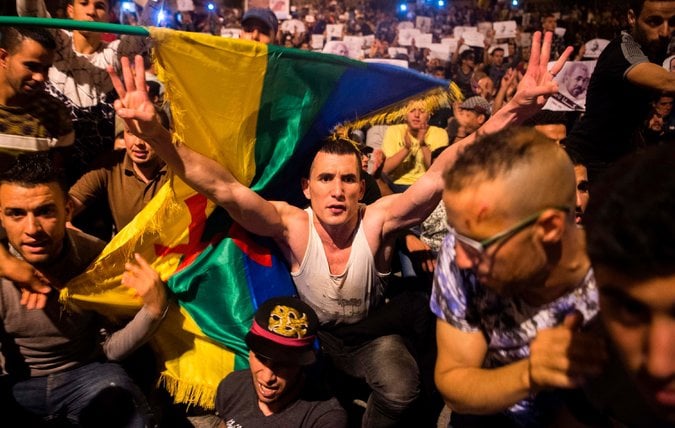
Moroccans gather to protest mistreatment by government and ruling monarchy authorities in late May 2017. Protests, and anger at the ruling class, has continued to grow. Photo: Fadel Senna/AFP
Morocco has long been viewed as a center of stability, with development potential and openness to reform. It has also been a beacon for foreign investment for these regions, considered in many respects an oasis surrounded by a volatile region. Yet in the last month, unusually fervent protests have shaken things, exposed vast inequality and drawn attention the country’s economically depressed northern region. Many see parallels between Morocco’s burgeoning unrest now and the Arab Spring revolts of 2011.
Recently I covered the emergence of these protests, borne from a fisherman in the town of Al-Hoceima killed while trying to reclaim his haul which had been confiscated by police. An opposition group turned this tragedy into a rallying cry, using it as evidence of the government’s disregard for the people’s welfare. They demanded economic support, infrastructure improvements, better hospitals and schools, and an end to ruling regime corruption. In a country not known for political activism, protests spread and grew in terms of participation and frequency; some of the lead organizers were arrested.
It didn’t take long for the protests to grow beyond the isolated northern region of Rif, where Al-Hoceima is located. On June 11, at least 10,000 Moroccans (according to police; march leaders claim the total was much higher) took to the streets of the capital Rabat to show solidarity with the northern protesters. Notably, the Rabat movement was led by the Justice and Spirituality group; an Islamist movement, it played a lead role in Arab Spring-inspired protests in 2011 which resulted in Morocco’s king initiating some democratic reforms. However, these reform have proved mostly hollow and ineffective. Morocco’s king and royal representatives retain a tight grip of control on all aspects of running the country (Morocco has the Arab world’s longest-ruling monarchy). As a perfect example of this, the Moroccan ruling authorities have banned Justice and Spirituality from organizing a political party or being represented in government.
As of June 15, about 100 members of the opposition movement had been arrested. There were calls for King Mohamed VI to intervene to diffuse the growing unrest. After meeting with the Moroccan monarch, newly elected French President Emmanuel Macron commented that King Mohamed is interested in “calm[ing] the situation in the Rif region by responding to the demands of this movement.” Silya Ziani, an opposition leader, called for the king’s involvement saying “We hear about the king investing in major projects abroad. What about us?” Yet the king has not responded or engaged these requests in any way.
Arrests continued on a daily basis over the next week, with no indication the protesters’ grievances would be addressed. In fact, the ministry of justice reported to parliament that it felt the government acted with “maturity, responsibility, wisdom, and in accordance with legal provisions” in breaking up gatherings, some of which featured violent clashes with police. A second major protest in Rabat, planned for June 19, was quickly shut down.
A New York Times op-ed on June 28 by Ursula Lindsey focused on the Moroccans’ plight. As she writes, the monarchy’s promises of democratic reform and giving the people more say in their government and more control over their lives have been largely empty. What’s more, the scale has instead tipped more in the opposite direction: more power and influence by the ruling class. “The king is the country’s highest religious authority, its pre-eminent political actor and its largest fortune. Everyone defers to him and knows that the only decisions that truly count are his.” Plus, according to Lindsey the fisherman’s death in Al-Hoceima just exemplified what many Moroccans knew all too well: “arbitrary and humiliating treatment by the state.”
The more international attention drawn to the Morocco unrest, the better. More world leaders and international organizations need to be aware of it, and (as Macron did) encourage the ruling regime to address the people’s concerns in genuine, meaningful, and non-violent ways. The government may be satisfied with how it handled the resistance this spring. But if they continue to use their authority to oppress and imprison those who disagree with them, Morocco may see a turbulent summer.